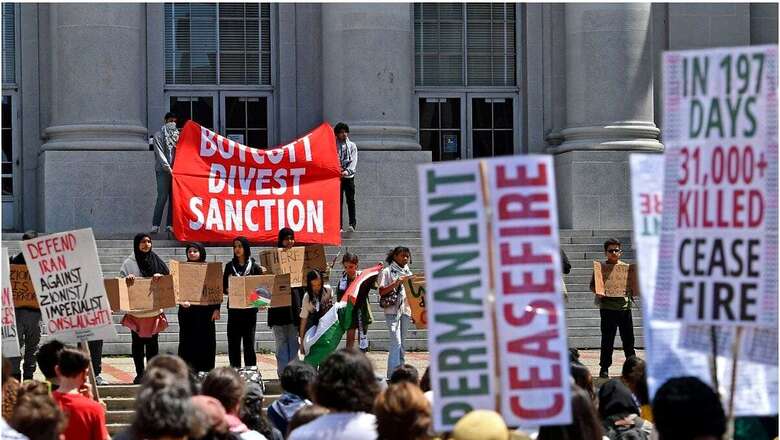
views
Several Indian students studying in the US are suffering from anxiety and uncertainty due to protests that have roiled American universities where students are demanding divestment from Israel and a total end to the war in Gaza.
Indian students speaking to the Indian Express said that as they watch their fellow students being handed suspensions or facing disciplinary actions, they have an additional anxiety. They fear visa revocation, expulsion, even deportation because F-1 visas can be revoked if students are expelled from their respective universities.
A student from India studying in Columbia University – where protests led to police action, arrests and storming of a campus building – told the newspaper that she was divided between joining the “pro-Palestine” movement on campus and how it would impact her future if she were to face disciplinary action.
Several other Indian students told the Indian Express that even though they are not new to concept of student activism based on their experiences in Indian universities, the idea of joining the ongoing protests in American universities is fraught with dangers because they have to be mindful of their financial dependence on loans or aid from the university.
Students are pitching in various forms – by fundraising, spreading the word on campus. But they are steering clear of the encampments where police and students have faced off.
A student said she has to be mindful of the fact that she is being able to afford her education due to financial aid provided by the university.
A student from Delhi pursuing a PhD at Yale University said that the first thing that crossed their mind when they saw the protests was that their university funds their tuition and that their visa might be revoked.
The newspaper citing a professor at Princeton University said that the expulsion of a student would indeed have an impact on the F-1 visa of any international student.
Citing FAQs on different university websites, the report went on to highlight that when a student is suspended or dismissed, “the student who is in F1 or J1 status cannot legally remain in the US”.
It further added that American universities are expected to update an international student’s status in the Student and Exchange Visitor Information System (SEVIS) within 21 days of suspension or expulsion, which means that the American government is notified immediately of the change in status.
The newspaper cited Viral Doshi, a US college admissions consultant, and said that suspensions and expulsions are reflected in a student’s record. He said Indian students should not “cross the fine line” even though students can file an appeal to the university, though there is no guarantee that the appeal might work or not work.
“Let’s remember, when you go to a foreign country, you are a guest of that country and as a guest, you must not cross the boundary beyond a certain level that has been assigned to you. You can’t think like a US citizen, the laws valid for them are not necessarily valid for you,” Doshi was quoted as saying.
Some students have dared to go to the encampments, they said. A 30-year-old PhD student at University of Pennsylvania said that protest leader advise international students to stay away from the line of barricading whenever they anticipate an escalation.
“Although the atmosphere here is not as hostile as it is in New York, we are keeping phone numbers of legal support handy and are careful while participating in protests,” a student from Delhi studying at the University of Wisconsin, Madison was quoted as saying by the Indian Express.
Indian faculty members are also torn on how to manage the issue. They say that they find it hard to maintain peace in the classroom between students who represent both camps.
“It is challenging to maintain peace in the classroom between students who resonate with both sides of the issue… It is difficult for international teachers on contracts as we might not get permanent employment and risk termination,” a faculty member from Columbia University said.



















Comments
0 comment